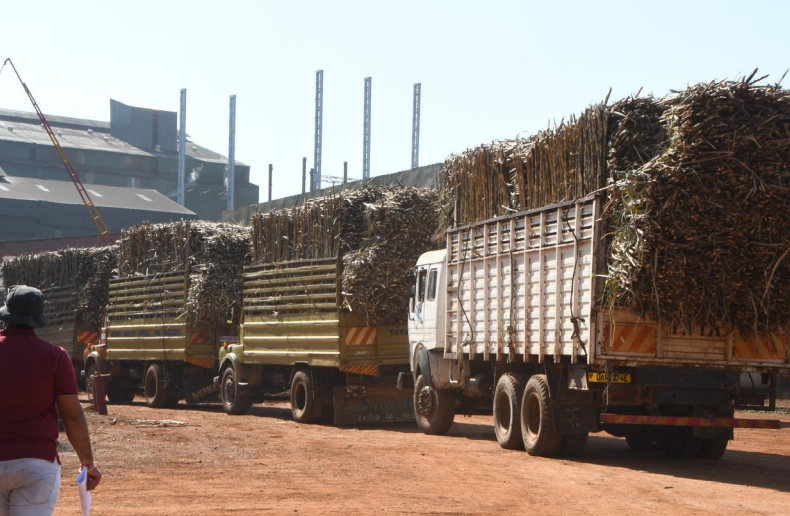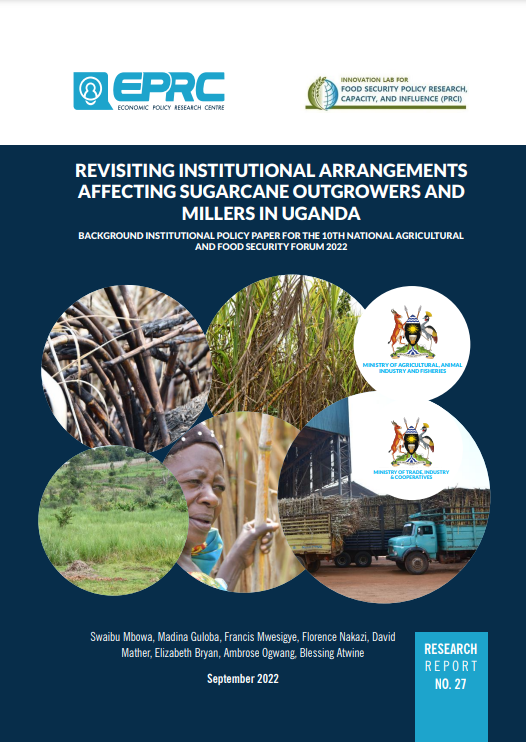PRCI Center for Policy Leadership stewarding push for policy reform in the Ugandan sugarcane sector
Policymakers in Uganda look to Economic Policy Research Center for leadership on reforming sugarcane policy and regulations.
Kampala, Uganda — How sweet success is for researchers and the government. Most importantly, the sugarcane growers of Uganda, as the top technical management at the Ministry of Finance Planning and Economic Development, agree to facilitate the development of a Regulatory Impact Assessment (RIA) report for the sugarcane sector as a first step to reforming the 2010 National sugar policy and the 2020 Sugar Act.
 As part of a three-year program in partnership with the Innovation Lab for Food Security Policy Research, Capacity, and Influence (PRCI) and the International Food Policy Research Institute (IFPRI), researchers at Economic Policy Research Center (EPRC) have been working to revitalize the sugarcane sector to sustainably increase farm productivity and build an enabling policy environment for the entire sugarcane value chain.
As part of a three-year program in partnership with the Innovation Lab for Food Security Policy Research, Capacity, and Influence (PRCI) and the International Food Policy Research Institute (IFPRI), researchers at Economic Policy Research Center (EPRC) have been working to revitalize the sugarcane sector to sustainably increase farm productivity and build an enabling policy environment for the entire sugarcane value chain.
EPRC is one of three African Centers for Policy Leadership (CPLs) supported by (PRCI) through funding and capacity strengthening initiatives. EPRC is Uganda's leading policy think tank in economic research and policy development. It researches and analyses various monetary policy issues, including poverty, trade, agriculture, and public finance. EPRC aims to inform policy and practice through rigorous research and analysis.
In the summer of 2021, the programme started with a forum titled “Rethinking Sugarcane Governance Structures To Better Address Rural Poverty And Food Insecurity.” The sugarcane value chain is one of Uganda's most important agro-industry propelling sectors. Over 29,000 households grow sugarcane, and the industry provides on-farm employment opportunities for over 600,000 people and contributes significantly to the country's GDP. Sugarcane is one of 14 strategic commodities the government of Uganda has targeted to foster agro-industrialization. The research conducted by EPRC aims to provide policymakers, stakeholders, and the public with evidence-based insights that can inform the formulation of policies that support the sector's inclusive and sustainable growth and development.
Following the public dialogue held in August 2021, EPRC conducted extensive research, including interviews with key players in the industry, community dialogues, and visits to cane-growing households across the country. Sugarcane is grown primarily in four regions, Busoga, Bunyoro, Buganda, and Acholi. However, it is still being determined if the sugarcane industry has benefitted the communities or is dragging them deeper into food insecurity and poverty.
 The interviews revealed that in 2022, at least 11,364 farmers had abandoned cane growing due to a significant price drop, the lowest in recent memory. However, there was a recovery in the second half of the year. The study also shows that there have been significant gaps in the implementation of existing policies, including the 2010 National Sugar Policy and the Sugar Act of 2020. EPRC’s findings from the research and interviews have now been published in a report to provide evidence for authorities to better the sector.
The interviews revealed that in 2022, at least 11,364 farmers had abandoned cane growing due to a significant price drop, the lowest in recent memory. However, there was a recovery in the second half of the year. The study also shows that there have been significant gaps in the implementation of existing policies, including the 2010 National Sugar Policy and the Sugar Act of 2020. EPRC’s findings from the research and interviews have now been published in a report to provide evidence for authorities to better the sector.
To ensure that the findings reach a wider audience, EPRC has launched an outreach program that includes publishing and disseminating policy briefs, the abridged version of the report, and the organization of a series of stakeholder meetings. The policy briefs will provide policymakers with concise summaries of the research findings and policy recommendations. In contrast, the stakeholder meetings provided a forum for stakeholders to discuss the research findings and their implications for policy.
In September of 2022, the report was presented at the 10th National Forum on Agriculture and Food Security held at Sheraton Hotel in Kampala. In November of 2022, Dr Swaibu Mbowa, a Senior Research Fellow at EPRC, presented the study to more than 20 legislators in Kampala. The policymakers and the technical leadership of the two key Ministries of Agriculture and Trade welcomed the recommendations and committed to improving the enabling environment for the sugarcane sub-sector.
In February 2023, a significant milestone was reached by EPRC in its policy engagement - outreach program when the top technical management at the Ministry of Finance Planning and Economic Development bought the idea that the current 2010 National Sugar Policy (NSP) and 2020 Sugar Act did not reflect the dynamics in the sector. It was necessary to start implementing reforms on both NSP and the Act. EPRC was given the green light to facilitate the development of the Regulatory impact assessment (RIA) report for the sugarcane sector as the first step towards implementing these policy reforms.
EPRC will continue to provide evidence to government as it moves through the next steps of developing the RIA and other policy processes of reforming the sugarcane sector. The publication of the research and the outreach program is part of EPRC's commitment to promoting evidence-based policymaking in Uganda. The Centre believes that providing policymakers with rigorous research and analysis can contribute to developing policies that promote sustainable economic growth and development in Uganda. EPRC hopes that its research will inform policymakers and stakeholders in the industry, leading to a brighter future for sugarcane farmers in the country.



 Print
Print Email
Email




